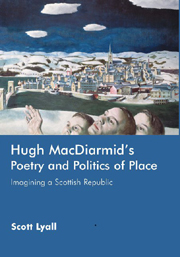Book contents
- Frontmatter
- Contents
- Dedication
- Acknowledgements
- Abbreviations of Works by Hugh MacDiarmid
- A Note on the Text
- Map
- Introduction: Imagining a Scottish Republic
- 1 ‘Towards a New Scotland’: Selfhood, History and the Scottish Renaissance
- 2 Debatable Land
- 3 ‘A Disgrace to the Community’
- 4 At the Edge of the World
- 5 ‘Ootward Boond Frae Scotland’: MacDiarmid, Modernism and the Masses
- Index
5 - ‘Ootward Boond Frae Scotland’: MacDiarmid, Modernism and the Masses
Published online by Cambridge University Press: 12 September 2012
- Frontmatter
- Contents
- Dedication
- Acknowledgements
- Abbreviations of Works by Hugh MacDiarmid
- A Note on the Text
- Map
- Introduction: Imagining a Scottish Republic
- 1 ‘Towards a New Scotland’: Selfhood, History and the Scottish Renaissance
- 2 Debatable Land
- 3 ‘A Disgrace to the Community’
- 4 At the Edge of the World
- 5 ‘Ootward Boond Frae Scotland’: MacDiarmid, Modernism and the Masses
- Index
Summary
High modernism was cosmopolitan and elitist. Many of its canonical literary artists left their country of birth, seeking in foreign metropolises for new experimental perspectives that they believed could not be envisioned in the philistine provinces of home. In A Portrait of the Artist as a Young Man (1916), James Joyce sends Stephen Dedalus into Continental exile ‘to forge in the smithy of my soul the uncreated conscience of my race’. Intended to ‘Hellenize Ireland’, the linguistically intimidating modernism of Joyce's Ulysses (1922) was a pan-European creation, written in Trieste, Zurich and Paris between 1914 and 1921. Born in St Louis in 1888, T. S. Eliot travelled to England looking for knowledge and experience, searching also for the traditional culture he thought lacking in the United States. Ironically, European civilisation was in the process of being fragmented not only by the Great War but also by the American populism from which the Harvard- and Oxford-educated poet wished to flee. Eliot's idea that the centres of Western culture cannot hold – the ‘Falling towers’ of ‘Jerusalem Athens Alexandria / Vienna London’ are ‘Unreal’ – is of regret to a modernist concerned with upholding conservative values. Ezra Pound was born in Idaho in 1885 but moved to London in 1909 in a cultural bid to ‘MAKE IT NEW’. He established Imagism in 1912 with H. D. and Richard Aldington, and coedited the influential Vorticist review BLAST with fellow radical reactionary Wyndham Lewis before being attracted to Italy by Mussolini's Fascism.
- Type
- Chapter
- Information
- Hugh MacDiarmid's Poetry and Politics of PlaceImagining a Scottish Republic, pp. 151 - 191Publisher: Edinburgh University PressPrint publication year: 2006



